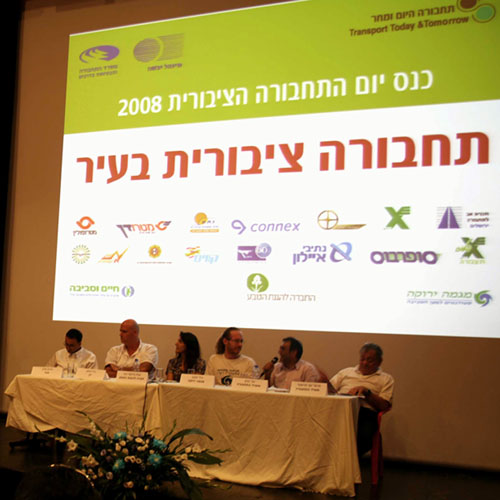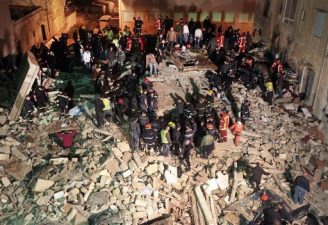Tuesday, September 23 was Public Transportation Day in Israel, the local answer to European Mobility Week and World Carfree Day, an attempt to “remind the world that we don’t have to accept our car-dominated society.” In Europe, they managed to keep the cars off the streets for a few hours. In Israel, we will have to wait until Yom Kippur for our own day without cars.
The day’s events featured a professional conference on “Public Transportation in the City,” organized by Transport Today & Tomorrow and the Ministry of Transportation, and a race between different modes of transportation, organized by SPNI Tel Aviv.
The conference focused on the link between urban planning and mass transit, and on the efforts of Israel’s three major cities to develop their own public transportation systems.
Dr. Yodan Rofe, an architect, professor and member of Merhav-Movement for Israeli Urbanism, opened the conference with a presentation of an urban design project that would transform Menahem Begin Road in Tel Aviv, a traffic-clogged artery and business district, into Begin Boulevard – an urban boulevard in which cars share the road with bus lanes, bike paths, street trees and pedestrian-friendly sidewalks.
According to Rofe, Begin Road, which was planned to maximize car traffic, is no longer just a funnel to the city’s central business district – it is the city’s new central business district. However, instead of viewing the road as the major urban project of the next 20 years, the city is treating it like just another highway, and intends to preserve the current volume of car traffic on the street.
Ruti Amir, of Ayalon Highways, responded that her company is very proud of the plans for Begin Boulevard, and noted that compromises are always made between conceptualization and implementation.
Amir Asraf, of the Treasury’s Budgets Department, praised Haifa’s new Metronit, a mass transit system based on Bus Rapid Transit (BRT) technology, as a model for metropolitan transport. The Metronit, said Asraf, will cost 550 million NIS to build over 3 years, and is expected to carry 20 million passengers yearly. A cable car leading up to the Technion and Haifa University are also in the planning stages.
Regarding the deadlock in planning Tel Aviv’s mass transit system, Asraf laid the blame squarely on the Tel Aviv Municipality. “Don’t tell me Tel Aviv promotes public transport,” he said. The Treasury conducted lengthy negotiations with the Tel Aviv Municipality, Asraf told the audience, and expressed its willingness to fund an extensive BRT system, but the city insisted on an underground train. “If they were to decide on BRT, tomorrow morning 4 lines would be ready for implementation,” he said.
Representatives of the Tel Aviv Municipality were conspicuously absent at the conference. However, Yishai Dotan, the CEO of NTA, the company in charge of planning Tel Aviv’s light rail/subway network, was on hand to offer a very convincing account of the benefits of the system. According to Dotan, 7 lines are in the planning stages, and NTA has already attained the approval of all relevant government ministries and all of the cities along the routes.
According to Dotan, the mass transit system that NTA is planning in Tel Aviv would benefit the local economy to the tune of almost 6 million NIS, and would save 48 million hours of lost time, 201,000 tons of carbon dioxide emissions and 6,500 traffic accidents annually. The system would consist of 176 kilometers of routes, and would carry 427 million passengers a year by 2030.
However, Dotan also offered a warning to all of those present:
If we don’t solve our problem-solving culture, we’ll be stuck in this traffic jam forever.

A bus, a bike and a car leave Petach Tikva for Tel Aviv. Which one will get there first? (Photo courtesy of Omer Cohen)
In the afternoon, a race took place between a Dan bus, a bike rider and a car. The 6km race began in Petach Tikva, passing through Bnei Brak and Ramat Gan on its way to Arlozoroff train station in Tel Aviv.
To the surprise of, well, not many, Rachel Gilad-Volner, a veteran activist and candidate for the Tel Aviv city council, was the first to cross the finish line on her bicycle after only 20 minutes. The bus, traveling in an designated bus lane (normally these are not enforced, but in honor of the occasion a policeman on a motorbike kept car traffic out of the bus lane), came in second. The car, driven by Meretz City Councilwoman Meital Lehavi, got stuck in traffic and finished last.
Green organizations (along with the Ministries of Finance and Transportation) support Bus Rapid Transit and designated bus lanes as quick and easy solutions to the traffic nightmare that is metropolitan Tel Aviv. Tel Aviv already have some 50km of bus lanes, but they are neither enforced nor physically separated from car traffic, and thus do little to improve public transport in the city.






Thank you, Jesse, for summing up this important day’s activities for those of us unable to make it to Tel Aviv. As a Jerusalemite, I attended the panel session in the capital on public transportation issues, with concerns and solutions offered by numerous parties running in the municipal council elections on November 11. The evening was thoroughly depressing – so many problems, so few politicians who care – but in the end I was encouraged by the number of candidates who felt this was a priority issue, and seemed knowledgeable and motivated enough to do something about it. Now if we can only make sure that everyone (I mean everyone!) votes…